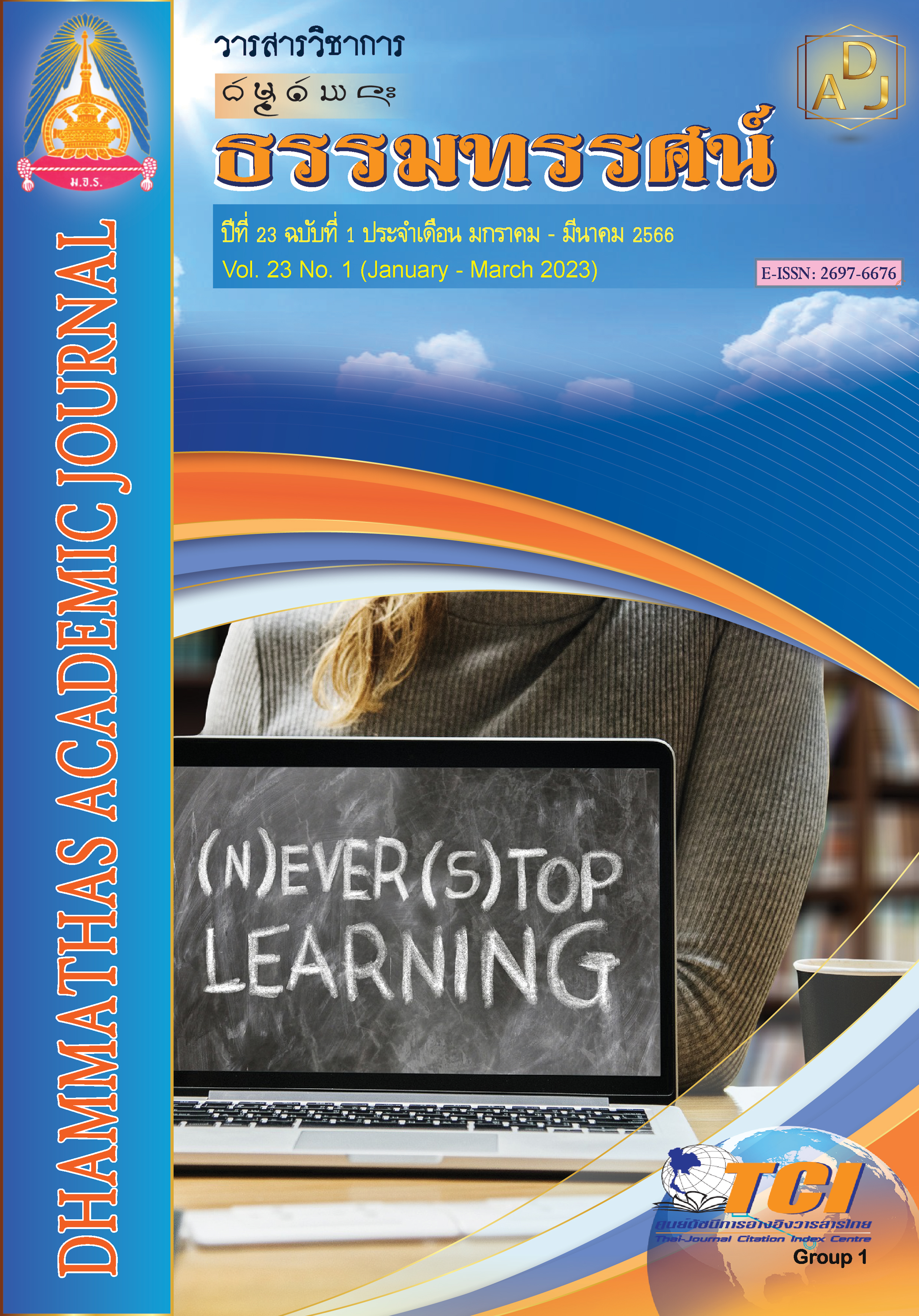Cultural Presentation and Community Participation Process in Mon Cultural Heritage Management: A Case Study of Saladaeng Nuea Community Chiang Rak Noi Subdistrict, Sam Khok District, Pathum Thani Province
Main Article Content
Abstract
The objective of this research was to investigate; 1) Presentation of Mon culture in all dimensions, i.e. moral, material, legal and social under the participation of Thai Mon community at Saladaeng Nuea Temple, 2) The model of Mon culture management with participation of Wat Sala Daeng Nuea community under the concept of New Public Governance. The research is qualitative research. Data collection was primary data by interviews with multi-stakeholder groups ranging from government, community and private sectors, along with secondary data from relevant documents and research. Data were analyzed through content analysis and descriptive analysis.
The major findings revealed as follows:
1. Presentation of culture has been classified into 4 dimensions, namely Morality presented through prayers, doctrine according to Buddhism. Material Culture through the architecture of pagodas, houses, utensils, Mon food, Mon language, and dress. Rule of law through 12 months of customs, regulations and traditions, including beliefs. Social Culture through practicing oneself in cultural traditions, how to dress for important events and the principle of adhering to gratitude.
2. Participatory Mon cultural management process model through New Public Management. The government has an active role in the conservation of Mon through cooperation from many sectors including the public sector and Mon people of Saladaeng Nuea community have joined in pushing for the expression of Mon identity through participation in various rituals and dressing and the university provides knowledge and transfers the knowledge of the Mon people in other areas to the community.
Article Details

This work is licensed under a Creative Commons Attribution-NonCommercial-NoDerivatives 4.0 International License.
เพื่อให้เป็นไปตามกฎหมายลิขสิทธิ์ ผู้นิพนธ์ทุกท่านต้องลงลายมือชื่อในแบบฟอร์มใบมอบลิขสิทธิ์บทความ ให้แก่วารสารฯ พร้อมกับบทความต้นฉบับที่ได้แก้ไขครั้งสุดท้าย นอกจากนี้ ผู้นิพนธ์ทุกท่านต้องยืนยันว่าบทความ ต้นฉบับที่ส่งมาตีพิมพ์นั้น ได้ส่งมาตีพิมพ์เฉพาะในวารสาร วิชาการธรรม ทรรศน์ เพียงแห่งเดียวเท่านั้น หากมีการใช้ ภาพหรือตารางของผู้นิพนธ์อื่นที่ปรากฏในสิ่งตีพิมพ์อื่นมาแล้ว ผู้นิพนธ์ต้องขออนุญาตเจ้าของลิขสิทธิ์ก่อน พร้อมทั้ง แสดงหนังสือที่ได้รับการยินยอมต่อบรรณาธิการ ก่อนที่บทความจะได้รับการตีพิมพ์References
ชนาคัลภ์กันยกร พันธ์หว้าทันกร และสุพิชชา โตวิวิชญ์. (2564). บทบาทของวัดศาลาแดงเหนือต่อวิถีชีวิตชุมชนไทย-มอญ บ้าน ศาลาแดงเหนือในอำเภอสามโคก จังหวัดปทุมธานี. วิวิธวรรณสาร, 5(2), 135-161.
ชุติมา สังคะหะ. (2561). อาหารกับการท่องเที่ยวเชิงวัฒนธรรมชุมชนชาวมอญ กรณีศึกษา ชุมชนชาวมอญ เทศบาลตำบลบางหลวง อำเภอเมือง จังหวัดปทุมธานี. วารสารมนุษยศาสตร์ และสังคมศาสตร์ นายเรืออากาศ, 6(2), 52-62.
ไททัศน์ มาลา. (2561). การจัดการปกครองสาธารณะแนวใหม่ (New Public Governance: NPG): แนวคิด และการประยุกต์ใช้ในการจัดการปกครองท้องถิ่น. Valaya Alongkorn Review, 8(1), 179-194.
ภดารี กิตติวัฒนวณิช. (2556). วิจัยเชิงปฏิบัติการเพื่อศึกษากระบวนการมีส่วนร่วมและแนวทางการออกแบบที่เหมาะสมในการออกแบบพิพิธภัณฑ์ชุมชน กรณีศึกษา: ชุมชนมอญวัดศาลาแดงเหนือ ตำบลเชียง รากน้อย อำเภอสามโคก จังหวัดปทุมธานี. (วิทยานิพนธ์สถาปัตยกรรมมหาบัณฑิต). ปทุมธานี: มหาวิทยาลัยกรุงเทพ.
รวิธร ฐานัสสกุล. (2563). เรียนรู้ความสำเร็จ สู่ความสุขที่ยั่งยืน บ้านศาลาแดงเหนือ จังหวัดปทุมธานี. สำนักส่งเสริมการเรียนรู้และบริการวิชาการ มหาวิทยาลัยราชภัฏวไลยอลงกรณ์ ในพระบรมราชูปถัมภ์. ปทุมธานี: ซิติพริ้นท์.
ศูนย์มานุษยวิทยาสิรินธร. (2565). ศาลาแดงเหนือ หมู่บ้านชาวไทยเชื้อสายมอญและวิถีชีวิตริมน้ำ. เข้าถึงได้จาก https://www.sac.or.th/exhibition/24communities/saladaengnua/
สถาบันวิจัยและพัฒนาพื้นที่สูง. (2563). พืชผักพื้นบ้านชาวมอญ สะท้อนวิถีชีวิตกับแนวคิดกินอาหารให้เป็น "ยา”. เข้าถึงได้จาก https://www.hrdi.or.th/Articles/Detail/62
สิทธิโชค วิบูลย์, สุเทพ บุญซ้อน และปิยะวรรณ เลิศพานิช. (2554). การศึกษาการอนุรักษ์ทางวัฒนธรรมชาวมอญเพื่อการพัฒนาการท่องเที่ยว กรณีศึกษา: ชุมชนศาลาแดงเหนือ จังหวัดปทุมธานี. (รายงานการวิจัย). ปทุมธานี: มหาวิทยาลัยราชภัฏวไลยอลงกรณ์ ในพระบรมราชูปถัมภ์.
เหมือนพิมพ์ สุวรรณกาศ. (2558). มรดกทางวัฒนธรรม: การสร้างตัวตนคนมอญสามโคก จังหวัดปทุมธานี. (รายงานการวิจัย). ปทุมธานี: มหาวิทยาลัยธรรมศาสตร์.
Dhirathiti, N. S. (2019). Co-production and the provision of lifelong learning policy for elderly people in Thailand. Public Management Review, 21(7), 1011-1028.
Osborne, S. P. (2010). Introduction The (New) Public Governance: a suitable case for treatment?. London: Routledge.
Palumbo, R. & Trocciola, G. (2015). Co-producing services to enhance cultural heritage. The role of co-production in improving the quality of tourism services. Retrieved from

